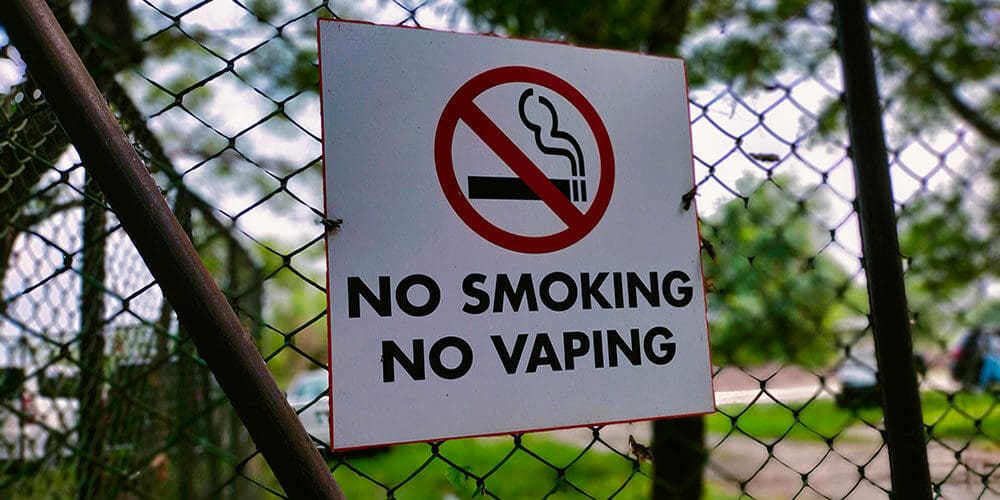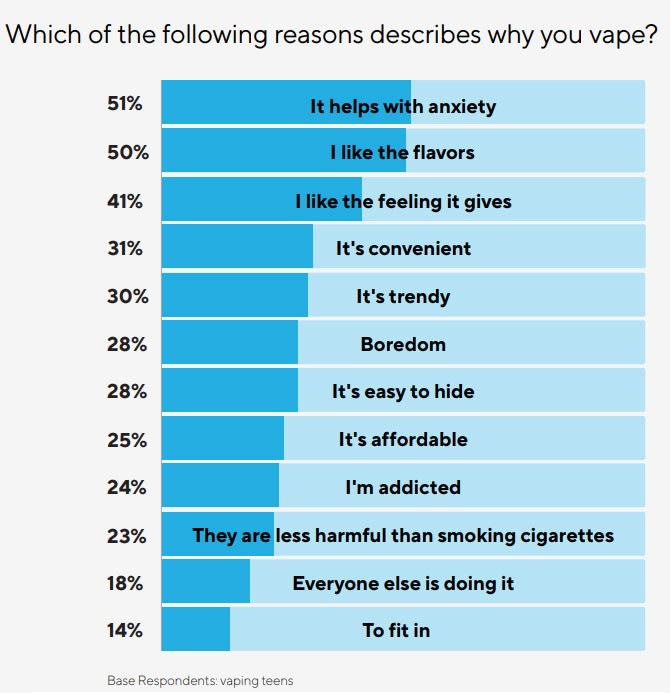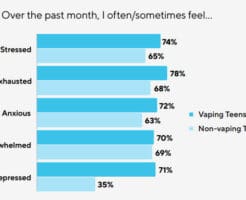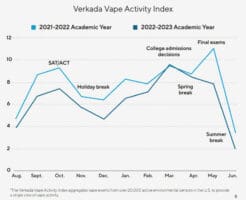Study: Teen Vaping Impacts Student Academic Performance, Mental Health
Vaping teens are twice as likely to feel depressed and 53% of teachers report vaping teens struggle to stay motivated.

Photo: Mahir, Adobe Stock
As researchers continue to study the impact of vaping on users of all ages, a new study revealed vaping in teens has been linked to lowered academic performance, decreased student engagement, and increased depression.
Verkada, a cloud-based building security systems provider, partnered with Harris Poll to create the 2023 Teen Vaping Survey, which was distributed to 2,650 Americans, including parents, high school teachers, and vaping and non-vaping teens. Coupled with the company’s insights from more than 20,000 U.S. vape-detecting devices, the survey showed a 20% increase in vaping activity in the 2022-2023 academic year compared to the year prior. A 2022 Centers for Disease Control and Prevention (CDC ) survey found 14% of all high schoolers vape, which the agency says is concerning as brains don’t finish developing until a person is around 25 years old.
The Verkada study also found vaping teens are twice as likely as non-vaping teens to have felt depressed in the last month (71% vs. 35%), and are significantly less likely to feel positive about their physical health (42% vs. 67%). Vaping teens are also more likely than non-vaping teens to report feeling stressed, exhausted, anxious, and overwhelmed. (See Slide 1 for further breakdown)
The study also looked at when vaping activity spikes throughout the academic year and found vaping often trends up during key moments throughout the year when students often experience stress. This includes the start of the school year, college admission decisions, final exams, and SATs/ACTs. (See Slide 2 for further breakdown)

Graphic: Why students say they vape (Source: 2023 Verkada Teen Vaping Survey)
Teens were asked why they vape. Among the top responses were, “It helps with anxiety,” “I like the feeling it gives,” and “I like the flavors.” (See side graphic). In June, the CDC announced e-cigarette sales rose 46.6% in the last three years and were largely driven by fruity or menthol-flavored products. Data published last year from the National Youth Tobacco Survey also found 85% of middle and high school students who reported using e-cigarettes were buying flavored versions.
Additionally, 87% of teachers agree vaping in school is disruptive to the learning environment, and 92% say classroom disruptions due to vaping have some or serious negative impact on overall student academic performance. More than half of teachers (53%) also report vaping teens struggle to stay motivated, 51% report they have trouble focusing, and 47% report decreased classroom activity. (See Slide 3 for further breakdown)
Furthermore, 44% of teachers report they sometimes or frequently/very frequently deal with classroom disruptions due to vaping, and 52% of non-vaping teens report their learning potential is lessened due to classroom disruptions caused by vaping.
“The post-pandemic resurgence of teen vaping has made the already difficult job of educating middle school and high school students even more challenging,” said Brandon Davito, Senior Vice President of Product and Operations at Verkada. “Teachers and school administrators have the best visibility into the impact of vaping on teens, and they are rightly concerned. The findings from this study reinforce what we are hearing from school staff across the country and issue an urgent warning for all parents, administrators, and teens to take action.”
Other key findings from the study include:
- Nearly all teens who vape (96%) view teen vaping as a problem, with nearly 61% of vaping teens considering themselves to be addicted and 54% wanting to quit vaping altogether.
- 72% of vaping teens worry about the health effects of vaping; 81% of vaping teens who want to quit worry about the health effects; and 61% of vaping teens don’t want to quit despite the health effects.
- Almost all teens surveyed report that bathrooms are where vaping occurs most frequently on campus (90% of non-vaping teens and 70% of vaping teens), followed by outside, hallways, classrooms, and the cafeteria. (See Slide 4 for further breakdown)
- Nearly two-thirds (61%) of vaping teens who want to quit have avoided going to the bathroom. (See Slide 5 for further breakdown)
- 55% of teachers noticed vaping students ask to use the bathroom more frequently than non-vaping students.
- 77% of vaping teens agree it’s easy to vape at school without being noticed and 61% agree it’s easy to vape at school without repercussions.
- Most teachers and teens agree increasing security and implementing technology are the most effective ways to limit and reduce vaping among students. (See Slide 6 for further breakdown)
View charts of the report findings here or download the full report here.
If you appreciated this article and want to receive more valuable industry content like this, click here to sign up for our FREE digital newsletters!
 Leading in Turbulent Times: Effective Campus Public Safety Leadership for the 21st Century
Leading in Turbulent Times: Effective Campus Public Safety Leadership for the 21st Century
This new webcast will discuss how campus public safety leaders can effectively incorporate Clery Act, Title IX, customer service, “helicopter” parents, emergency notification, town-gown relationships, brand management, Greek Life, student recruitment, faculty, and more into their roles and develop the necessary skills to successfully lead their departments. Register today to attend this free webcast!











This was a good article thanks for the free information, not sure how you have gotten all the information but its good.